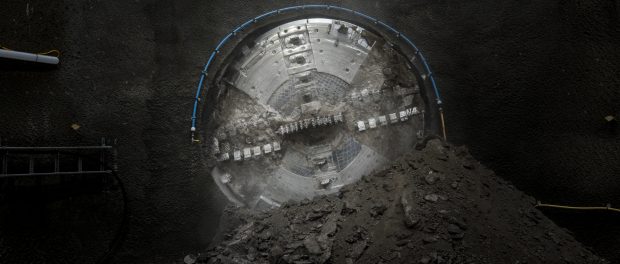First tunnelling machine breaks ground on super sewer

Balfour Beatty, alongside its joint venture partners Morgan Sindall and BAM Nuttall has seen one of their two tunnelling boring machines (TBM) become the first to break through the ground to complete a section of tunnel for London’s new super sewer.
The TBM named after suffragist Charlotte Despard, is digging the Frogmore Connection Tunnel from Wandsworth to Fulham as part of the Thames Tideway Tunnel project to clean up the River Thames from sewage pollution.
The 1.1km tunnel will take sewage overflows from King George’s Park into the main 25km super sewer at Fulham, where it will be transferred to east London for treatment instead of polluting the River Thames.
The 500m southern section of the Frogmore Connection Tunnel, from Dormay Street to King George’s Park, is now complete. Charlotte will now be lifted from the shaft, taken back to Dormay Street and placed back into the ground to tunnel 600 metres north to Fulham.
Sally Cox, Project Director for the joint venture, said: “This breakthrough, the first on the Tideway project, marks another key step toward a cleaner, healthier River Thames. Despite being the smallest TBM on the Tideway project, Charlotte is creating vital infrastructure that will benefit Londoners and their river for many years to come. Our tunnelling team has done a fantastic job getting this machine to King George’s Park and will now focus on completing the northern section of the Frogmore Connection Tunnel.”
Charlotte is a three-metre-wide machine and more than 70 metres long, while the Frogmore Connection Tunnel is being created at a depth of around 30 metres.
The TBM has been refurbished and previously worked on a water ring-main project in north London.
The first section of the main tunnel is also close to completion, as tunnelling machine Millicent approaches Fulham after tunnelling almost 5km from Battersea. So far, 8km of the Thames Tideway Tunnel has been built, with four tunnelling machines in the ground.
Once complete in 2024, the tunnel will help stop tens of millions of tonnes of raw sewage pouring into the river every year.

